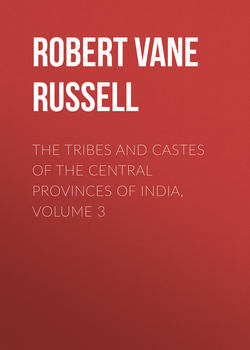Читать книгу The Tribes and Castes of the Central Provinces of India, Volume 3 - Robert Vane Russell - Страница 52
Gond
(e) Funeral Rites
34. Mourning and offerings to the dead
ОглавлениеMourning is usually observed for three days. The mourners abstain from work and indulgence in luxuries, and the house is cleaned and washed. The Gonds often take food on the spot after the burial or burning of a corpse and they usually drink liquor. On the third day a feast is given. In Chhindwāra a bullock or cow is slaughtered on the death of a male or female Gond respectively. They tie it up by the horns to a tree so that its forelegs are in the air, and a man slashes it across the head once or twice until it dies. The head is buried under a platform outside the village in the name of the deceased. Sometimes the spirit of the dead man is supposed to enter into one of the persons present and inform the party how he died, whether from witchcraft or by natural causes. He also points out the place where the bullock’s or cow’s head is to be buried, and here they make a platform to his spirit with a memorial stone. Red lead is applied to the stone and the blood of a chicken poured over it, and the party then consume the bodies of the cow and chicken. In Mandla the mourners are shaved at the grave nine or ten days after the death by the brother-in-law or son-in-law of the deceased, and they cook and eat food there and drink liquor. Then they come home and put oil on the head of the heir and tie a piece of new cloth round his head. They give the dead man’s clothes and also a cow or bullock to the Pardhān priest, and offer a goat to the dead man, first feeding the animal with rice, and saying to the dead man’s spirit, ‘Your son- or brother-in-law has given you this.’ Sometimes the rule is that the priest should receive all the ornaments worn on the right side of a man or the left side of a woman, including those on the head, arm and leg. If they give him a cow or bullock, they will choose the one which goes last when the animals are let out to graze. Then they cook and eat it in the compound. They have no regular anniversary ceremonies, but on the new moon of Kunwār (September) they will throw some rice and pulse in front of the house and pour water on it in honour of the dead. The widow breaks her glass bangles when the funeral takes place, and if she is willing she may be married to the dead man’s younger brother on the expiry of the period of mourning.
